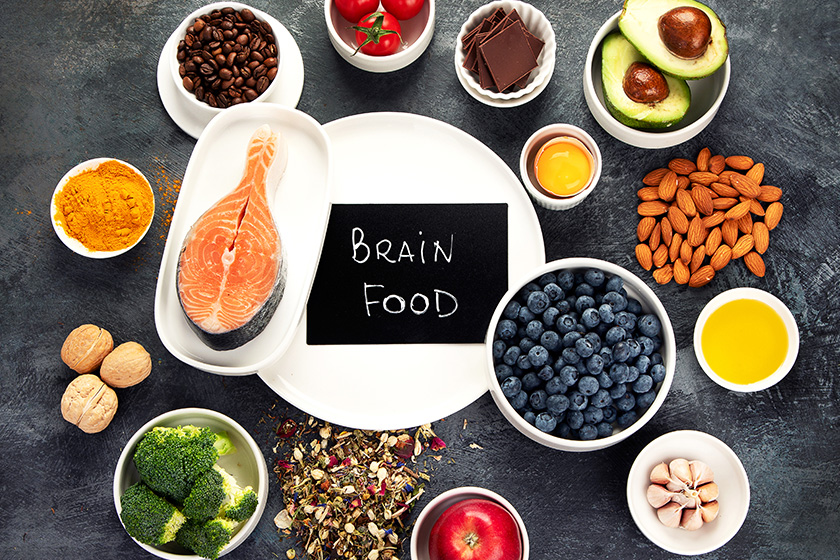Maintaining cognitive health becomes a priority as we age, especially for those interested in Assisted Living options. Your food choices today can significantly influence your mental clarity and cognitive abilities tomorrow. Focusing on foods to prevent dementia is about adding years to life and life to those years. This article explores how certain foods can support brain health and potentially reduce the risk of dementia.
The Power of Omega-3 Fatty Acids
One of the champions in the fight against cognitive decline is omega-3 fatty acids, found abundantly in fish such as salmon, mackerel, and sardines. These essential fats are known for their anti-inflammatory properties, which can protect the brain against damage and deterioration. Regular consumption of omega-3-rich foods can help maintain the integrity of brain cells and enhance neural function, making it a crucial part of the diet for those in their golden years.
Antioxidant-Rich Berries: A Sweet Defense
Berries such as blueberries, strawberries, and blackberries are delicious and packed with antioxidants. These natural compounds help fight against oxidative stress and inflammation, two enemies of a healthy brain. The vivid colors in berries come from flavonoids, which have been shown to boost brain health and enhance memory retention. Integrating a variety of berries into your diet can be a delightful way to support cognitive functions.
Whole Grains for Steady Energy
Whole grains like oats, quinoa, and barley are excellent fiber sources and have a low glycemic index. This means they provide a steady supply of glucose to the brain, which is crucial for maintaining cognitive function. Consistent energy levels can help alert your mind and enhance overall brain function. Including whole grains in your daily meals can support brain health and help maintain mental sharpness.
Leafy Greens: The Nutrient Powerhouses
Leafy green vegetables such as spinach, kale, and Swiss chard contain vitamins and nutrients essential for brain health. These include vitamin K, lutein, folate, and beta-carotene. Research suggests that these nutrients may help slow cognitive decline and are thus vital in a diet aimed at preventing dementia. Incorporating a variety of leafy greens into meals can provide both nutritional benefits and a protective effect on brain health.
Nuts and Seeds: Compact Brain Boosters
Nuts and seeds are more than just snack foods. They’re compact sources of protein and essential fats, antioxidants, and vitamin E, which can protect neurons from oxidative stress. Almonds, walnuts, and sunflower seeds are some of the best choices for those looking to support cognitive health through diet. A small handful of nuts or seeds daily can make a significant difference in maintaining brain function and preventing cognitive decline.
Turmeric: The Golden Spice
Turmeric, a staple in Indian cuisine, is celebrated for its curcumin content, which possesses potent anti-inflammatory and antioxidant properties. This golden spice has been linked to reduced markers of inflammation and oxidative damage in the brain. Adding turmeric to your diet can be as simple as sprinkling it in your cooking, ensuring you and your family receive its protective benefits.
Staying Hydrated: Essential for Cognitive Health
While not food, water is crucial in maintaining cognitive function. Dehydration can lead to confusion and impaired cognitive function, especially in those in their golden years. Ensuring adequate hydration can support overall brain health and functionality, making it an essential part of a dementia-preventive diet.
Coffee and Tea: Caffeine with a Purpose
Coffee and tea aren’t just warm, comforting beverages; they also provide significant health benefits when consumed in moderation. Both drinks contain caffeine, which has been shown to enhance brain function. Additionally, tea, especially green tea, contains catechins, antioxidants that can protect the brain from oxidative stress and may reduce the risk of dementia. Moderate amounts of coffee or tea can help maintain cognitive sharpness and overall brain health.
Vitamin D: The Sunshine Vitamin
Vitamin D plays a pivotal role in brain health, and unfortunately, many adults in their golden years do not receive enough of it. Adequate vitamin D levels are crucial for preventing cognitive decline. This vitamin can be sourced from sunlight exposure, fortified foods, and supplements. Ensuring you or your beloved family members get enough vitamin D can be a simple yet effective way to support brain health and reduce the risk of dementia.
Cognitive Cuisine: Combining Foods for Optimal Benefits
Creating a diet that combines these brain-boosting foods can lead to greater benefits than consuming any single food alone. A balanced diet rich in fruits, vegetables, whole grains, and lean proteins can provide a synergy that supports overall brain health and cognitive function. This approach to eating nourishes the brain and helps maintain physical health and wellness, which is crucial for those in their golden years.
At our Retirement community, we understand the importance of a balanced, nutritious diet in maintaining cognitive health and overall well-being. We offer meals crafted to include all the brain-boosting foods discussed, ensuring you and your loved ones receive the best nutritional care.
Explore how we can help you embrace a healthier lifestyle in a caring and supportive environment. Contact us today to learn more about our amenities and services and how we can help make a positive difference in your life.







